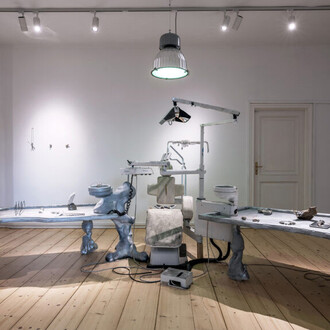The Media Majlis Museum at Northwestern University in Qatar officially opened its 10th exhibition, Memememememe, with a vibrant launch event that welcomed over 400 guests, including media professionals, academics, students, creatives, and artists, who engaged firsthand with the exhibition’s installations. Coinciding with the Museum’s 5th anniversary, the exhibition will run until December 4th, 2025, offering an interactive exploration of how internet memes shape, influence, and reflect contemporary society.
The exhibition advances Northwestern Qatar’s vision as a catalyst for evidence-based storytelling focused on the Global South. Curated by Jack Thomas Taylor, curator of art, media, and technology at the Museum, and Assistant Curator Amal Zeyad Ali, the exhibition moves beyond surface-level humor to examine memes as powerful cultural barometers shaping collective consciousness. Framed through four conceptual measures—Mass, Length, Time, and Volume—Memememememe invites visitors to consider how memes spread, mutate, and influence our shared digital reality.
“The opening of every exhibition is an exciting moment, and this one was no different. It was a great experience welcoming people from across the community and seeing visitors actively engaging with the exhibition,” said Marwan M. Kraidy, dean and CEO of Northwestern Qatar. “What struck me most was the diversity of engagement; students, creatives, scholars, and professionals all connecting with the work in different ways. It showed how something as seemingly simple as a meme can open up rich conversations about culture, communication, and the digital world we all navigate. That kind of critical engagement is at the heart of NU-Q’s mission, and the Media Majlis Museum is a fully integrated component.”
The scenography, unveiled to attendees on opening day, is designed by Shepherd Studio, an award-winning multi-disciplinary design and architecture practice based in Bahrain. The studio transformed the museum space into a laundromat-inspired metaphor for the endless cycle of meme circulation, reflecting the ongoing churn of digital communication.
Opening night guests experienced a rich array of works from both established and emerging artists across Qatar, the UAE, Saudi Arabia, South Korea, and beyond. The opening also debuted seven newly commissioned works from Alia Leonardi, Anne Horel, Cem A., Eman Makki, Mauro C. Martinez, Orkhan Mammadov, and Seo Hyojung, each offering critical reflections on digital memory, collective identity, and online dissent.
Audience favorites included the interactive photobooth by Copenhagen-based artist and coder Andreas Refsgaard, and Narrative Laundry, a digital installation by creative technologist Adnan Aga. These were developed alongside content created in collaboration with subject matter experts and Superposition, a Netherlands-based design studio known for its interactive media experiences.
Reflecting on the exhibition’s significance, curator Taylor noted: “This exhibition examines memes not as mere entertainment, but as inheritors of traditional visual communication tactics that serve as both mass media and cultural critique. The provocative imagery and symbolic gestures that have always captured attention continue to do so, only now through the Internet—proving that visual communication strategies remain consistent even as mediums evolve. Yet while we obsessively measure our digital lives, memes resist quantification even as they shape collective consciousness. Rather than presenting a gallery of memes, we offer critical analysis of how these fluid, anonymous artifacts function as societal barometers—crossing borders and generations while remaining deeply nuanced."
Alfredo Cramerotti, director of the Media Majlis Museum, added: “This exhibition zooms in on a communication device we all use daily yet rarely stop to interrogate. Through design, scenography, and newly commissioned works, Memememememe invites us to reflect on the true cultural weight and influence of memes—those seemingly trivial fragments that profoundly shape how we perceive and navigate our world.”
As the first university museum dedicated to exploring journalism, communication, and media in the Arab world, the Media Majlis Museum continues to create immersive experiences that challenge conventional narratives.










